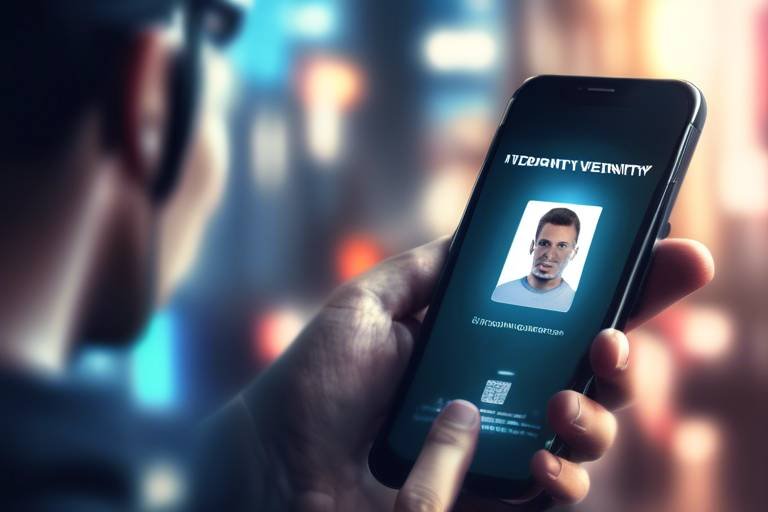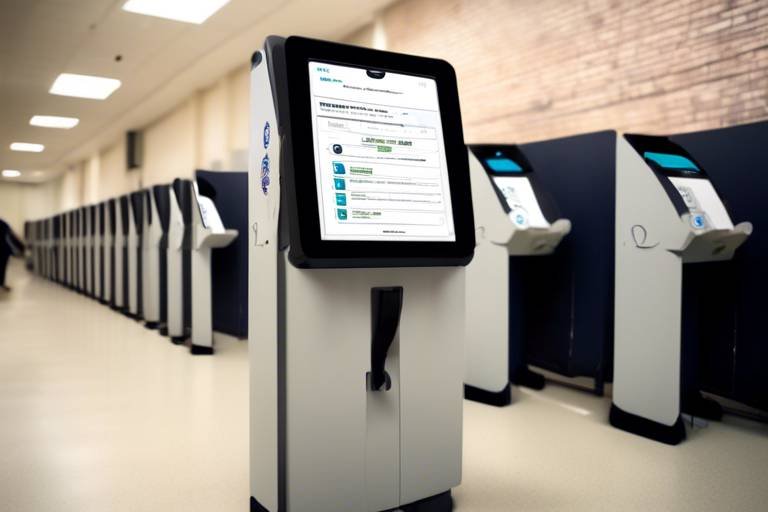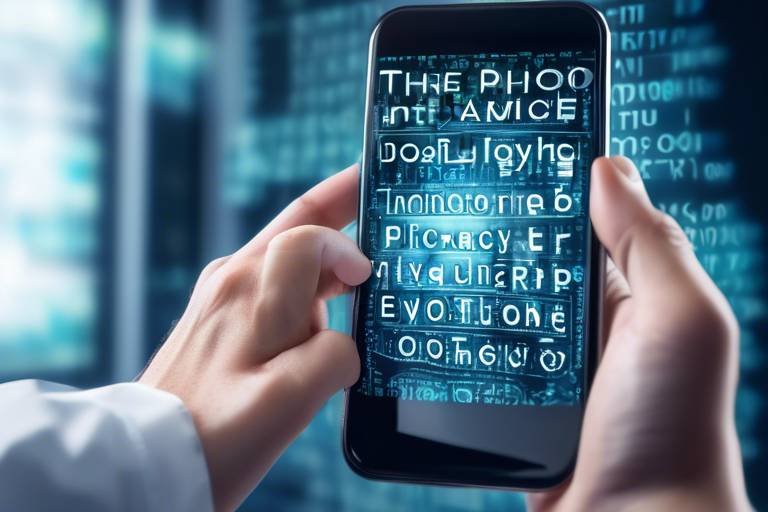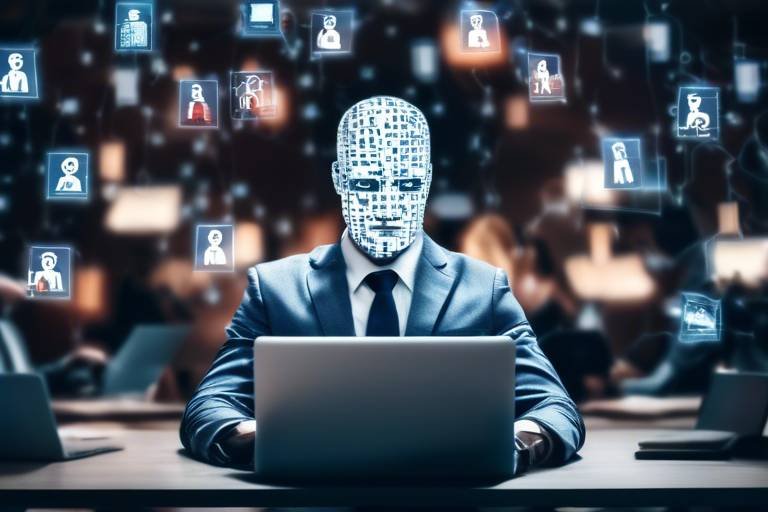The Role of Blockchain in Identity Verification
In today's fast-paced digital world, where our identities are often just a click away from being compromised, the need for secure and reliable identity verification has never been more critical. This is where blockchain technology steps in as a game-changer. Imagine a world where your identity is not only secure but also under your control. Sounds appealing, right? Blockchain offers a decentralized solution that not only enhances security but also improves privacy and efficiency in identity management. By leveraging the principles of transparency and immutability, blockchain is transforming how we verify identities across various sectors, from finance to healthcare.
So, what exactly is blockchain? At its core, blockchain is a decentralized ledger system that records transactions across many computers. This means that once data is entered, it cannot be altered without the consensus of the network, making it incredibly secure. The implications for identity verification are profound. Traditional methods often rely on centralized databases that are vulnerable to hacking and fraud. In contrast, blockchain's decentralized nature minimizes these risks, ensuring that personal information remains safe and secure.
As we delve deeper into the world of blockchain and identity verification, it's essential to recognize the challenges posed by traditional methods. Identity theft, data breaches, and operational inefficiencies plague conventional systems, leaving individuals and organizations at risk. With blockchain, we can address these vulnerabilities head-on, paving the way for a more secure and efficient identity verification process.
In the following sections, we will explore how blockchain enhances identity verification, its real-world applications, and the future trends that may shape this exciting field. Are you ready to discover how blockchain is revolutionizing identity management? Let's dive in!

Understanding Blockchain Technology
This article explores how blockchain technology is transforming identity verification processes, enhancing security, privacy, and efficiency while providing a decentralized solution to identity management challenges across various sectors.
Blockchain technology is often described as a revolutionary digital ledger system that has the potential to change the way we manage and verify identities. At its core, a blockchain is a distributed database that maintains a continuously growing list of records, called blocks, which are securely linked together in chronological order. Each block contains a number of transactions, and once a block is filled, it is added to the chain, hence the name blockchain.
One of the fundamental principles of blockchain is its decentralization. Unlike traditional databases that are typically controlled by a central authority, a blockchain is maintained by a network of computers, or nodes, that work together to validate transactions. This decentralized nature not only enhances security but also fosters greater transparency. Every participant in the network can view the entire blockchain, making it nearly impossible to alter the data without consensus from the majority of nodes.
Another key feature of blockchain is its use of cryptography to secure data. Each block includes a unique cryptographic hash of the previous block, creating a secure link between them. This means that if someone tries to tamper with a block, it would require altering every subsequent block in the chain, which is practically infeasible. This level of security is crucial for identity verification, where the integrity of personal information is paramount.
To illustrate how blockchain operates, consider the following table that highlights its main components:
| Component | Description |
|---|---|
| Block | A collection of data or transactions. |
| Chain | A sequence of blocks linked together. |
| Node | A computer that participates in the blockchain network. |
| Consensus Mechanism | The protocol that ensures all nodes agree on the validity of transactions. |
In addition to these features, blockchain technology introduces the concept of smart contracts. These are self-executing contracts with the terms of the agreement directly written into code. Smart contracts can automate identity verification processes, reducing the need for intermediaries and speeding up transactions. Imagine a world where you could prove your identity with a simple click of a button, all thanks to the power of smart contracts!
As we delve deeper into the world of blockchain and its applications in identity verification, it's crucial to understand these foundational elements. They not only highlight the potential of blockchain to address current challenges in identity management but also pave the way for innovative solutions that prioritize security and privacy.
This section discusses the limitations and vulnerabilities of traditional identity verification methods, including issues related to fraud, data breaches, and inefficiencies in existing systems.
A closer look at how conventional identity verification processes are susceptible to data breaches, leading to significant privacy concerns for individuals and organizations alike.
Explores the consequences of data breaches on individuals, including identity theft, financial loss, and the long-term effects on personal privacy.
Examines how organizations face reputational damage, legal ramifications, and financial losses due to inadequate identity verification measures.
Discusses the inefficiencies of traditional identity verification methods, including time consumption, high costs, and the complexities involved in managing identity data.
This section outlines the key benefits of using blockchain technology for identity verification, highlighting its potential to revolutionize the way identities are managed and verified.
Explains how blockchain's decentralized nature enhances security by reducing the risk of single points of failure and making identity data more resilient to attacks.
Describes how blockchain empowers individuals by giving them greater control over their personal data, allowing them to share information selectively and securely.
This section showcases various industries and sectors where blockchain is being implemented for identity verification, illustrating its practical benefits and use cases.
Highlights how financial institutions are leveraging blockchain for secure customer identification and compliance with regulatory requirements, reducing fraud risk.
Examines the use of blockchain in healthcare for verifying patient identities, ensuring data integrity, and facilitating secure sharing of medical records.
This section explores emerging trends and innovations in blockchain identity verification, including advancements in technology and potential regulatory developments that may shape its future.
Discusses the potential for integrating blockchain with artificial intelligence and biometric technologies to create more robust and secure identity verification systems.
Explores the evolving regulatory landscape surrounding blockchain identity verification, including compliance challenges and the need for standardized practices.
This section will address common questions regarding blockchain technology and its role in identity verification.

Challenges in Traditional Identity Verification
The landscape of identity verification has been dominated by traditional methods for decades, but as the world evolves, these methods are increasingly showing their age. One of the most glaring issues is the vulnerability to fraud. With identity theft on the rise, conventional systems often fall short in protecting sensitive information. Just think about it: how many times have you heard stories of people losing their identities due to a data breach? It’s a sobering thought that leaves many feeling exposed and anxious.
Moreover, traditional identity verification processes are often riddled with inefficiencies. From long wait times during verification processes to the cumbersome paperwork involved, these methods can be a major headache for both individuals and organizations. Imagine standing in line, filling out endless forms, and waiting for someone to approve your identity—it's not just time-consuming; it's downright frustrating!
At the heart of the issues with traditional identity verification are the significant data breaches that have become all too common. These breaches not only expose individuals to the risk of identity theft but also raise serious questions about privacy. When organizations store vast amounts of personal data, they become prime targets for cybercriminals. The fallout from such breaches can be catastrophic, leading to financial loss and long-lasting impacts on personal privacy.
For individuals, the consequences of these data breaches can be severe. Victims of identity theft often face a long and arduous journey to reclaim their identities. This can lead to financial loss, not to mention the emotional toll it takes. Imagine waking up one day to find out that someone has opened credit cards in your name or drained your bank account. The implications can linger for years, affecting everything from credit scores to personal relationships.
Organizations are not immune to the repercussions of inadequate identity verification measures either. A single data breach can result in reputational damage that takes years to repair. Customers lose trust, and businesses can face legal ramifications, hefty fines, and significant financial losses. It’s like a domino effect—one misstep in security can lead to a cascade of negative outcomes that affect the entire organization.
On top of these challenges, traditional identity verification methods are often plagued by operational inefficiencies. The processes are usually slow and labor-intensive, leading to high operational costs. Companies spend countless hours and resources managing identity data, which could be better utilized elsewhere. The complexities involved in verifying identities can bog down entire systems, making it difficult for organizations to operate smoothly.
In summary, while traditional identity verification methods have served their purpose, they are increasingly inadequate in today's fast-paced digital world. The vulnerabilities to fraud, inefficiencies, and privacy concerns pose significant challenges that cannot be ignored. As we look toward the future, it’s clear that a more secure and efficient solution is needed—one that can address these pressing issues head-on.
- What are the main challenges of traditional identity verification? Traditional identity verification faces challenges such as vulnerability to fraud, data breaches, operational inefficiencies, and privacy concerns.
- How do data breaches affect individuals? Data breaches can lead to identity theft, financial loss, and long-term effects on personal privacy.
- What impact do data breaches have on organizations? Organizations can experience reputational damage, legal issues, and significant financial losses due to data breaches.
- What is the future of identity verification? The future of identity verification is likely to involve more secure and efficient methods, including blockchain technology and integration with AI and biometrics.

Data Breaches and Privacy Concerns
In the digital age, where our lives are increasingly intertwined with technology, data breaches have become a significant concern for both individuals and organizations. Traditional identity verification methods often rely on centralized databases, which are prime targets for cybercriminals. When these systems are compromised, sensitive personal information can be stolen, leading to dire consequences. Imagine waking up one day to find that your identity has been hijacked, your bank accounts drained, and your personal data sold on the dark web. This nightmare scenario is all too real for many who have fallen victim to such breaches.
One of the most alarming aspects of data breaches is the privacy concerns they raise. When personal information is exposed, it not only affects the immediate victims but also erodes trust in the systems designed to protect us. For instance, organizations that experience a data breach often face a backlash from their customers, who feel vulnerable and betrayed. The repercussions can be devastating, resulting in loss of business, legal penalties, and a tarnished reputation.
Furthermore, the implications of data breaches extend beyond individual incidents. They create a ripple effect that can impact entire industries. For example, a breach in a financial institution can lead to increased scrutiny from regulatory bodies, prompting stricter compliance requirements across the sector. This not only burdens organizations with additional costs but also creates a climate of fear where consumers are hesitant to trust digital platforms.
To illustrate the severity of data breaches, consider the following statistics:
| Year | Number of Data Breaches | Estimated Records Exposed |
|---|---|---|
| 2020 | 1,108 | 36 billion |
| 2021 | 1,291 | 22 billion |
| 2022 | 1,862 | 50 billion |
As shown in the table, the number of data breaches continues to rise, along with the staggering number of records exposed. This alarming trend highlights the urgent need for more secure identity verification methods. The question remains: how can we protect ourselves and our organizations from these pervasive threats? One promising solution lies in the adoption of blockchain technology, which offers a more secure and decentralized approach to identity verification.
In conclusion, the threat of data breaches and the resulting privacy concerns are significant challenges in today’s digital landscape. As we continue to navigate this complex environment, it’s crucial to seek out innovative solutions that prioritize security and trust. Blockchain technology stands out as a beacon of hope, promising to revolutionize identity verification and restore confidence in digital interactions.
- What is a data breach? A data breach occurs when unauthorized individuals gain access to sensitive information, often resulting in the theft of personal data.
- How can blockchain help with identity verification? Blockchain offers a decentralized and secure method for verifying identities, reducing the risk of data breaches and enhancing privacy.
- What are the implications of a data breach for individuals? Individuals may face identity theft, financial loss, and long-term privacy issues as a result of a data breach.
- What can organizations do to prevent data breaches? Organizations can implement stronger security measures, including adopting blockchain technology, to safeguard sensitive information.

Impact on Individuals
The consequences of data breaches in traditional identity verification processes can be devastating for individuals. Imagine waking up one morning to find that your identity has been stolen—your bank accounts drained, your credit score in shambles, and your personal information scattered across the dark web. This nightmare scenario is all too common in today’s digital landscape, where identity theft is on the rise. The impact of such breaches can be categorized into several significant areas:
- Identity Theft: When personal data is compromised, it can lead to unauthorized use of one’s identity. This can result in fraudulent transactions, opening new accounts in your name, or even criminal activities that can tarnish your reputation.
- Financial Loss: The immediate financial ramifications can be severe. Victims often face unexpected charges and may incur debts they never authorized. The time and effort required to rectify these issues can also lead to lost income.
- Long-term Privacy Concerns: Once your information is out there, it's nearly impossible to reclaim complete privacy. Individuals may find themselves constantly vigilant, fearing that their data could be exploited at any moment.
Moreover, the emotional toll cannot be overlooked. Victims of identity theft often experience feelings of vulnerability and anxiety, knowing that their personal information is no longer secure. This psychological burden can lead to stress and a decrease in overall well-being, affecting both personal and professional lives.
In addition to these direct impacts, individuals also face challenges in restoring their identities. The process of proving one's identity and rectifying the damage done can be lengthy and complicated, often involving multiple institutions and legal processes. This can be a frustrating experience, leaving victims feeling powerless and overwhelmed.
As we delve deeper into the digital age, it becomes increasingly clear that traditional identity verification methods are insufficient in protecting individuals. The reliance on outdated systems puts personal data at risk, and the fallout from breaches highlights the urgent need for more secure and efficient solutions. Blockchain technology offers a promising alternative, empowering individuals with greater control over their identities and enhancing their overall security.
- What is blockchain technology? Blockchain is a decentralized digital ledger that records transactions across many computers securely and transparently.
- How does blockchain improve identity verification? It enhances security, provides users with control over their data, and reduces the risk of fraud.
- Can blockchain prevent identity theft? While it cannot eliminate identity theft entirely, it significantly reduces the risk by providing a more secure way to manage personal data.

Impact on Organizations
Organizations today face a myriad of challenges when it comes to identity verification. The repercussions of inadequate measures can be quite severe, leading to significant reputational damage and financial losses. In an era where data breaches are alarmingly common, companies must recognize the importance of implementing robust identity verification systems. A single breach can tarnish a brand's reputation, erode customer trust, and lead to a turbulent relationship with stakeholders.
When organizations fail to secure their identity verification processes, they expose themselves to various risks. These risks can manifest in multiple ways:
- Reputational Damage: A company known for frequent data breaches may find it difficult to attract and retain customers. Trust is a fragile thing, and once it's lost, it can take years to rebuild.
- Legal Ramifications: With increasing regulations around data protection, organizations that fail to comply can face hefty fines and legal challenges. This not only affects their bottom line but also their operational integrity.
- Financial Losses: The costs associated with data breaches can be astronomical. From legal fees to compensating affected customers, the financial implications can cripple an organization.
Moreover, the operational inefficiencies stemming from traditional identity verification methods can further exacerbate these issues. Companies often find themselves bogged down by time-consuming processes that require extensive resources. This not only hampers productivity but also diverts attention from core business activities. For instance, lengthy verification processes can lead to delays in onboarding new customers or clients, which can result in lost opportunities and revenue.
In summary, the impact of inadequate identity verification on organizations is multifaceted and profound. As the digital landscape continues to evolve, organizations must adapt and innovate their identity verification strategies to mitigate risks and enhance their operational efficiency. This is where blockchain technology comes into play, offering a promising solution that can transform the way organizations approach identity management.
Q1: What are the main benefits of using blockchain for identity verification?
A1: Blockchain offers enhanced security, decentralization, improved user control over personal data, and increased efficiency in the identity verification process.
Q2: How does blockchain protect against data breaches?
A2: By decentralizing data storage and ensuring that no single point of failure exists, blockchain significantly reduces the risk of data breaches, making identity data more resilient to attacks.
Q3: Can blockchain technology be integrated with existing identity verification systems?
A3: Yes, many organizations are exploring ways to integrate blockchain with their current systems to enhance security and efficiency while maintaining compliance with regulations.
Q4: What industries are benefiting most from blockchain identity verification?
A4: Industries like financial services and healthcare are at the forefront of adopting blockchain for identity verification, as they require secure and efficient methods to manage sensitive data.

Operational Inefficiencies
When we think about identity verification, it’s easy to assume that the process is straightforward. However, the reality is that traditional methods are often riddled with that can lead to significant delays and increased costs. Imagine standing in a long line at the DMV, only to find out that you forgot an important document. This is a common scenario that illustrates how cumbersome and time-consuming traditional identity verification can be.
One of the primary inefficiencies stems from the reliance on outdated systems that require manual input and verification. Each time a person needs to prove their identity, they often have to provide the same information repeatedly, whether it’s for opening a bank account, applying for a job, or even signing up for a new phone plan. This redundancy not only wastes time but also increases the likelihood of human error. Additionally, the process can often take days or even weeks to complete, particularly when it involves multiple parties that need to verify the same information.
Furthermore, the costs associated with traditional identity verification processes can be staggering. Organizations often invest heavily in infrastructure, staffing, and training to manage the verification process. These costs can be broken down into several categories:
| Cost Category | Description |
|---|---|
| Infrastructure | Investment in physical and digital systems to manage identity data. |
| Staffing | Salaries for employees who handle identity verification tasks. |
| Training | Costs associated with training staff on compliance and security protocols. |
| Fraud Management | Expenses related to managing and mitigating identity fraud risks. |
These inefficiencies not only affect the organizations but also create a frustrating experience for individuals. Customers often feel like they are jumping through hoops just to prove who they are. This could lead to dissatisfaction and may even drive potential customers away. In a world where instant gratification is the norm, waiting for identity verification can feel like an eternity.
Moreover, the complexities involved in managing identity data can lead to security vulnerabilities. As organizations collect and store vast amounts of sensitive information, they become prime targets for cyberattacks. A single breach can expose thousands of personal records, leading to devastating consequences for both individuals and organizations. The inefficiencies of traditional methods create a perfect storm for data breaches, leaving everyone vulnerable.
In conclusion, operational inefficiencies in traditional identity verification processes are not just minor inconveniences; they represent a significant challenge that can impact both individuals and organizations alike. The need for a more efficient, secure, and user-friendly solution is more pressing than ever. As we explore the potential of blockchain technology, it becomes clear that it offers a promising alternative that addresses these inefficiencies head-on, paving the way for a more streamlined and secure identity verification process.
- What are the main challenges of traditional identity verification? Traditional methods are often slow, costly, and prone to errors, leading to operational inefficiencies.
- How does blockchain improve identity verification? Blockchain provides a decentralized, secure, and efficient way to manage identity data, reducing redundancies and enhancing user control.
- What industries can benefit from blockchain identity verification? Industries such as finance, healthcare, and government can greatly benefit from improved identity verification processes.

How Blockchain Enhances Identity Verification
When it comes to identity verification, traditional methods often leave much to be desired. Enter blockchain technology, a game-changer that promises to revolutionize the way we manage and verify identities. Imagine a world where your personal data is not only secure but also entirely under your control. This is the power of blockchain! By leveraging its unique attributes, we can tackle the myriad challenges posed by conventional identity verification systems.
One of the most significant advantages of blockchain is its decentralization. Unlike traditional systems that rely on a central authority to verify identities, blockchain operates as a distributed ledger. This means that no single entity has control over the data, making it much harder for hackers to compromise. Think of it as a highly fortified castle with multiple entry points, where each point is guarded by its own set of defenses. The decentralized nature of blockchain minimizes the risk of a single point of failure, enhancing overall security.
Moreover, blockchain enhances security through its cryptographic features. Each transaction or data entry is encrypted and linked to the previous one, creating an unalterable chain of records. This not only ensures data integrity but also makes it practically impossible for unauthorized users to tamper with sensitive information. In a world where data breaches are alarmingly common, this level of security is invaluable.
Another key benefit of blockchain is the improved user control it offers. With traditional systems, individuals often have little say over how their personal information is used and shared. Blockchain flips this narrative on its head. Individuals can manage their own identities and decide what information to share, with whom, and for how long. This selective sharing capability is akin to having a personal vault for your data, where you can choose to open the door just a crack when necessary, rather than allowing full access to everyone.
In addition, the transparency inherent in blockchain technology fosters trust among parties involved in the identity verification process. Since all transactions are recorded on a public ledger, stakeholders can verify each other's identities without relying on a third-party intermediary. This transparency can significantly reduce the chances of fraud and misrepresentation, making it easier for organizations to trust the identities of their clients or users.
To illustrate the benefits of blockchain in identity verification, consider the following table that outlines the key enhancements:
| Feature | Traditional Identity Verification | Blockchain Identity Verification |
|---|---|---|
| Control Over Data | Limited | Full Control |
| Security | Single Point of Failure | Decentralized and Encrypted |
| Transparency | Opaque | Transparent and Verifiable |
| Fraud Risk | High | Low |
In conclusion, blockchain technology not only enhances the security and efficiency of identity verification processes but also empowers individuals with greater control over their personal data. As we continue to explore and implement blockchain solutions, the potential for creating a more secure and user-friendly identity verification landscape is vast and exciting.
- What is blockchain technology? Blockchain is a decentralized digital ledger that records transactions across multiple computers, ensuring security and transparency.
- How does blockchain enhance security in identity verification? By decentralizing data storage and using cryptographic techniques, blockchain minimizes the risk of data breaches and unauthorized access.
- Can individuals control their own data on blockchain? Yes! Blockchain allows individuals to manage their personal information and decide how it is shared.
- What industries can benefit from blockchain identity verification? Industries such as finance, healthcare, and government can significantly improve their identity verification processes with blockchain technology.

Decentralization and Security
One of the most compelling advantages of blockchain technology lies in its decentralized nature, which fundamentally reshapes how we think about security in identity verification. Unlike traditional systems that rely on a central authority to manage and store data, blockchain operates on a network of computers, or nodes, that work together to validate and record transactions. This decentralization means that there is no single point of failure, making it significantly more difficult for hackers to compromise the entire system. Imagine a fortress with multiple gates; if one gate is breached, the others still stand strong. Similarly, in a blockchain environment, the distributed ledger ensures that even if one node is attacked, the integrity of the overall system remains intact.
Furthermore, the use of cryptographic algorithms in blockchain adds an additional layer of security. Each transaction is encrypted and linked to the previous one, creating a chain that is nearly impossible to alter without detection. This means that any attempt to tamper with identity data would be immediately visible to all network participants, effectively deterring fraudulent activities. In a world where data breaches are alarmingly common, blockchain's robust security measures provide a sense of trust and transparency that is often lacking in traditional identity verification systems.
To illustrate the difference in security approaches, consider the following table that compares traditional identity verification methods with blockchain-based systems:
| Aspect | Traditional Methods | Blockchain-Based Methods |
|---|---|---|
| Data Storage | Centralized databases | Decentralized ledger |
| Vulnerability to Attacks | High (single point of failure) | Low (distributed network) |
| Data Integrity | Can be altered or deleted | Immutable and transparent |
| Trust Level | Requires third-party verification | Trustless system (no intermediaries) |
In summary, the decentralization offered by blockchain technology not only enhances security but also fosters a new paradigm of trust in identity verification processes. By removing the reliance on centralized authorities and utilizing cryptographic techniques, blockchain is paving the way for a more secure and efficient method of managing identity data. With this shift, individuals can feel more confident that their personal information is safeguarded against the ever-evolving landscape of cyber threats.
Frequently Asked Questions
- What is blockchain technology? Blockchain is a decentralized ledger system that records transactions across multiple computers, ensuring data integrity and security.
- How does decentralization improve security? Decentralization eliminates single points of failure, making it harder for attackers to compromise the entire system.
- Can blockchain prevent data breaches? While no system is completely immune, blockchain's cryptographic security measures significantly reduce the risk of data breaches.

Improved User Control
One of the most compelling advantages of using blockchain technology for identity verification is the enhanced control it offers to users. In a world where personal data is often mishandled or exploited, blockchain provides a refreshing alternative that puts power back into the hands of individuals. Imagine a scenario where you can decide exactly what information to share, with whom, and for how long. This level of control is not just a dream; it’s a reality enabled by blockchain.
With traditional identity verification methods, users often have to surrender vast amounts of personal data to third parties, often without a clear understanding of how that data will be used or stored. This can lead to a sense of vulnerability and a lack of trust. However, blockchain changes the narrative. By leveraging cryptographic techniques, individuals can create secure digital identities that allow them to share only the necessary information when required. For example, if you need to verify your age for a service, you could provide just your birthdate rather than your entire identity. This selective sharing minimizes the risk of data misuse.
Furthermore, the decentralized nature of blockchain means that there is no central authority holding your data. Instead, your information is distributed across a network, enhancing security and reducing the risk of data breaches. This decentralization also means that you can maintain your identity even if a service provider goes out of business or is hacked. Your identity remains intact and secure, as it is not tied to a single entity.
To illustrate this improved user control, consider the following benefits:
- Selective Disclosure: Users can choose the specific information they want to share, reducing the risk of overexposure.
- Ownership of Data: Individuals have true ownership of their identity data, controlling how it is shared and used.
- Enhanced Privacy: With blockchain, personal data is more secure and less prone to unauthorized access.
Moreover, the use of blockchain can facilitate self-sovereign identity (SSI), a concept that empowers individuals to manage their identities without relying on external authorities. SSI allows users to create and control their digital identities, enabling them to interact with various services while maintaining their privacy. This is akin to having a digital passport that you can present whenever necessary, without the need to carry around sensitive documents that could be lost or stolen.
In conclusion, the shift towards blockchain for identity verification is a game-changer in terms of user control. It not only enhances security and privacy but also fosters a sense of trust and autonomy among individuals. As we continue to navigate an increasingly digital world, the ability to manage our identities securely and privately will become more important than ever.
1. What is user control in blockchain identity verification?
User control refers to the ability of individuals to manage their personal data, deciding what information to share and with whom, without relying on central authorities.
2. How does blockchain enhance privacy?
Blockchain enhances privacy by allowing users to share only necessary information through cryptographic techniques, minimizing the risk of data misuse.
3. What is self-sovereign identity (SSI)?
SSI is a concept that allows individuals to create and manage their digital identities independently, giving them complete control over their personal information.
4. Can blockchain prevent data breaches?
While blockchain cannot entirely eliminate the risk of data breaches, its decentralized nature significantly reduces the likelihood of large-scale data theft compared to traditional centralized systems.

Real-World Applications of Blockchain in Identity Verification
Blockchain technology is not just a buzzword; it's a revolutionary force that's reshaping how we verify identities across various sectors. Imagine a world where your identity is secure, easily verifiable, and free from the clutches of fraud. That's the promise of blockchain! Let's dive into some real-world applications that highlight its transformative power.
One of the most significant areas where blockchain is making waves is in the financial services sector. Banks and financial institutions are leveraging blockchain to enhance their customer identification processes. Traditionally, verifying a customer's identity can be a tedious and time-consuming task, often involving multiple documents and lengthy procedures. With blockchain, these institutions can securely store and manage identity data, significantly reducing the risk of fraud. For instance, customers can be verified using a secure digital identity that is immutable and transparent, making it easier for banks to comply with regulatory requirements while also ensuring a seamless experience for their clients.
Moreover, the healthcare industry is also witnessing a shift thanks to blockchain. Patient identity verification is crucial in ensuring that medical records are accurate and accessible only to authorized personnel. By utilizing blockchain, healthcare providers can create a secure and tamper-proof system for verifying patient identities. This not only enhances data integrity but also facilitates the secure sharing of medical records among different healthcare providers. Imagine a scenario where a patient can move between hospitals, and their entire medical history is instantly available and verified without the need for cumbersome paperwork. This is the future that blockchain is paving the way for.
In addition to finance and healthcare, blockchain is finding its way into various other sectors, including government services and education. Governments can utilize blockchain for issuing and verifying identities, such as passports and driver’s licenses, which can drastically reduce identity fraud. In education, blockchain can be used to verify academic credentials, ensuring that degrees and certifications are legitimate and easily accessible to employers.
To further illustrate the impact of blockchain on identity verification, let’s take a look at a table summarizing key applications across different industries:
| Industry | Application | Benefits |
|---|---|---|
| Financial Services | Secure Customer Identification | Reduced Fraud Risk, Regulatory Compliance |
| Healthcare | Patient Identity Verification | Data Integrity, Secure Record Sharing |
| Government | Issuing and Verifying IDs | Reduced Identity Fraud |
| Education | Verifying Academic Credentials | Legitimacy, Easy Access for Employers |
As we can see, the potential applications of blockchain in identity verification are vast and varied. Each sector stands to gain immensely from the enhanced security, privacy, and efficiency that blockchain offers. The beauty of this technology lies in its ability to provide a decentralized solution to identity management challenges, making it a game-changer in our increasingly digital world.
In conclusion, as more industries begin to adopt blockchain for identity verification, we can expect a significant reduction in fraud and inefficiencies. The future is bright, and it’s exciting to think about the endless possibilities that lie ahead!
Q: What is blockchain technology?
A: Blockchain is a decentralized ledger technology that securely records transactions across multiple computers, ensuring that the data is transparent and tamper-proof.
Q: How does blockchain enhance identity verification?
A: Blockchain enhances identity verification by providing a secure, immutable, and decentralized way to store and manage identity data, reducing the risks of fraud and data breaches.
Q: Which industries are using blockchain for identity verification?
A: Industries such as finance, healthcare, government, and education are leveraging blockchain technology to improve their identity verification processes.
Q: What are the benefits of using blockchain in identity verification?
A: The benefits include enhanced security, improved user control over personal data, reduced fraud risk, compliance with regulations, and operational efficiencies.

Financial Services
In the rapidly evolving world of , the need for secure and efficient identity verification has never been more critical. Traditional methods often involve lengthy processes that can lead to delays and increased costs, not to mention the heightened risk of fraud. Enter blockchain technology, a game-changer that is redefining how financial institutions approach identity verification. By utilizing a decentralized ledger, blockchain provides a transparent and secure way to manage identity data.
One of the most compelling advantages of blockchain in financial services is its ability to enhance customer identification. Financial institutions can store and verify customer identities in a way that is not only secure but also compliant with regulatory requirements. This is crucial for preventing fraud, as the immutable nature of blockchain means that once data is recorded, it cannot be altered or deleted without consensus from the network. This significantly reduces the risk of identity theft, which is a growing concern in today's digital age.
Moreover, blockchain technology allows for real-time verification of identities. For instance, when a customer opens a new account or applies for a loan, their identity can be verified almost instantly. This not only speeds up the onboarding process but also enhances customer satisfaction. Imagine a world where you can open a bank account in minutes rather than days—this is the future that blockchain promises.
To illustrate the impact of blockchain on financial services, consider the following table that outlines some key benefits:
| Benefit | Description |
|---|---|
| Enhanced Security | Decentralized storage reduces the risk of data breaches. |
| Faster Transactions | Real-time identity verification speeds up processes. |
| Cost Efficiency | Reduces costs associated with identity verification processes. |
| Regulatory Compliance | Ensures that institutions meet necessary legal requirements. |
Furthermore, the integration of blockchain in financial services extends beyond just identity verification. It opens up avenues for smart contracts, which can automate various processes, such as loan approvals and payment disbursements, based on predefined conditions. This automation not only reduces human error but also increases trust between parties, as the terms of the contract are transparent and immutable.
As we look towards the future, the adoption of blockchain in financial services is expected to grow exponentially. Financial institutions are beginning to recognize the potential of this technology, not just for identity verification, but for a wide range of applications that can enhance operational efficiency and customer trust. In a landscape where security and speed are paramount, blockchain stands out as a beacon of innovation.
- What is blockchain technology? Blockchain is a decentralized ledger system that records transactions across multiple computers securely and transparently.
- How does blockchain improve identity verification? It enhances security, reduces fraud risk, and allows for real-time verification of identities.
- Can blockchain be used in other sectors besides financial services? Yes, blockchain has applications in various industries, including healthcare, supply chain management, and government services.
- What are smart contracts? Smart contracts are self-executing contracts with the terms of the agreement directly written into code, enabling automatic execution when conditions are met.

Healthcare
In the ever-evolving landscape of healthcare, the importance of accurate and secure identity verification cannot be overstated. With sensitive patient data at stake, healthcare providers are constantly seeking ways to enhance the integrity of their identity verification processes. Enter blockchain technology, a game-changer that promises to revolutionize how patient identities are verified and managed. Imagine a world where patient records are not only secure but also easily accessible to authorized personnel, reducing the chances of fraud and errors. This is the potential that blockchain brings to the table.
One of the primary applications of blockchain in healthcare is in the verification of patient identities. Traditional methods often rely on centralized databases, which can become targets for cyberattacks. By utilizing a decentralized ledger system, blockchain ensures that patient identities are not only stored securely but also verified in real-time. This means that healthcare providers can access accurate patient information without the fear of data breaches, ultimately leading to better patient care.
Moreover, blockchain technology enhances the interoperability of health records. In a typical scenario, patients often have their health records scattered across multiple providers, which can lead to inconsistencies and delays in treatment. With blockchain, a patient's medical history can be securely shared across different healthcare systems, ensuring that every provider has access to the most up-to-date information. This seamless sharing not only improves the efficiency of care but also enhances the overall patient experience.
Additionally, the use of blockchain in healthcare can significantly reduce administrative costs. According to a recent study, administrative expenses account for nearly 25% of total healthcare costs. By streamlining identity verification processes, blockchain can help reduce the time and resources spent on manual verification and data entry. This allows healthcare professionals to focus more on what truly matters: patient care.
To illustrate the impact of blockchain in healthcare, consider the following table that highlights key benefits:
| Benefit | Description |
|---|---|
| Enhanced Security | Decentralized storage reduces the risk of data breaches and unauthorized access. |
| Improved Interoperability | Facilitates seamless sharing of patient records across different healthcare systems. |
| Cost Efficiency | Reduces administrative costs associated with identity verification and data management. |
| Patient Empowerment | Gives patients control over their own health data, allowing them to share it selectively. |
In conclusion, the integration of blockchain technology in healthcare identity verification presents numerous advantages, from enhanced security to improved patient experiences. As the healthcare industry continues to embrace digital transformation, blockchain stands out as a pivotal technology that can address many of the challenges currently faced in identity management. With ongoing advancements and increasing adoption, we are likely to see a future where healthcare is not only more secure but also more efficient and patient-centered.
- What is blockchain technology? Blockchain is a decentralized digital ledger that records transactions across multiple computers, ensuring transparency and security.
- How does blockchain improve healthcare? It enhances security, interoperability, and efficiency in identity verification processes, ultimately leading to better patient care.
- Are there any risks associated with blockchain in healthcare? While blockchain offers many benefits, challenges such as regulatory compliance and integration with existing systems remain.
- Can patients control their own data with blockchain? Yes, blockchain empowers patients to manage their health data and share it selectively with healthcare providers.

Future Trends in Blockchain Identity Verification
The world of blockchain identity verification is evolving at a breathtaking pace, and several emerging trends are set to shape its future. As we delve into this exciting landscape, it's crucial to recognize how technological advancements and regulatory changes are intertwined. One of the most significant trends is the integration of blockchain with artificial intelligence (AI) and biometric technologies. Imagine a system where your identity is verified not just through a password or a card, but through a sophisticated blend of your unique biological traits and AI algorithms that learn and adapt. This combination promises to create a more robust identity verification system that is not only secure but also user-friendly.
Furthermore, as organizations increasingly move towards a decentralized identity model, the need for standardized practices becomes paramount. Regulatory bodies are beginning to take notice, leading to potential developments in compliance frameworks that will govern how blockchain technology can be utilized for identity verification. For instance, we might see regulations that dictate how personal data is stored, shared, and protected within a blockchain environment. This is crucial because, while blockchain offers enhanced security, it also raises questions about data ownership and privacy that need to be addressed.
Another trend to watch is the rise of self-sovereign identity (SSI), a concept that empowers individuals to control their own digital identities without relying on centralized authorities. With SSI, users can selectively share their information with service providers, reducing the risk of data breaches and enhancing personal privacy. This approach not only fosters trust between users and organizations but also aligns with the growing demand for more transparent and ethical data practices.
Moreover, as blockchain technology matures, we can expect to see cross-border identity verification solutions emerge, which will facilitate seamless identity management across different jurisdictions. This is particularly important in our increasingly globalized world, where individuals may need to prove their identity in multiple countries. By leveraging blockchain's inherent properties of transparency and security, these solutions can simplify the verification process, making it faster and more reliable.
In summary, the future of blockchain identity verification is bright and full of potential. As we embrace these trends, it is essential to remain vigilant about the implications they may have on privacy, security, and regulatory compliance. The journey towards a more secure and efficient identity verification landscape is just beginning, and it promises to be a transformative experience for individuals and organizations alike.
- What is blockchain identity verification? Blockchain identity verification uses blockchain technology to securely manage and verify identities, providing a decentralized solution that enhances privacy and security.
- How does blockchain improve security in identity verification? By decentralizing data storage and eliminating single points of failure, blockchain significantly reduces the risk of data breaches and identity theft.
- What are self-sovereign identities? Self-sovereign identities allow individuals to own and control their personal data, sharing it selectively without relying on centralized authorities.
- What role will AI play in future identity verification? AI can enhance identity verification by providing intelligent algorithms that analyze and authenticate identities based on various data points, improving accuracy and security.
- Will regulations impact blockchain identity verification? Yes, as blockchain technology evolves, regulations will likely be established to ensure data protection, privacy, and compliance in identity verification processes.

Integration with AI and Biometrics
The integration of artificial intelligence (AI) and biometric technologies with blockchain is a game-changer in the realm of identity verification. Imagine a world where your identity is not only verified through a secure decentralized ledger but also enhanced by the intelligence of AI and the uniqueness of biometrics. This combination creates a robust, multi-layered defense against identity fraud, ensuring that only you can access your sensitive information.
AI algorithms can analyze vast amounts of data in real-time, recognizing patterns and anomalies that human eyes might miss. When applied to identity verification, AI can help detect fraudulent activities by continuously learning from new data inputs. For instance, if someone attempts to use a stolen identity, AI can flag this behavior by comparing it against established patterns of legitimate user activity. This proactive approach significantly reduces the risk of identity theft and fraud.
On the other hand, biometric technologies, such as fingerprint scanning, facial recognition, and iris scanning, add an additional layer of security. These unique identifiers are nearly impossible to replicate, making them a reliable method for confirming identity. When integrated with blockchain, biometric data can be stored securely and accessed only by authorized individuals, ensuring privacy and protection. Moreover, because blockchain is decentralized, there is no single point of failure, which means that even if one part of the system is compromised, your biometric data remains secure.
Consider a scenario in a financial institution where a customer wants to open a bank account. Instead of filling out lengthy forms and providing multiple documents, the customer can simply present their biometric data. The bank's AI system, integrated with blockchain technology, verifies the identity in seconds, pulling information from the blockchain ledger while ensuring that the data is accurate and up-to-date. This not only streamlines the process but also enhances user experience by making it quicker and more secure.
However, while the integration of AI and biometrics with blockchain presents numerous benefits, it also raises essential questions regarding privacy and ethical considerations. For example, how do we ensure that biometric data is used responsibly and not misused? What happens if the blockchain itself is compromised? Addressing these concerns is crucial for the widespread adoption of these technologies.
In summary, the synergy of AI, biometrics, and blockchain creates a powerful identity verification system that promises to enhance security, improve efficiency, and empower users. As we move forward, it's essential to navigate the challenges and ethical considerations to fully realize the potential of this innovative integration.
- What is blockchain technology? - Blockchain is a decentralized ledger system that records transactions across many computers securely and transparently.
- How does AI enhance identity verification? - AI analyzes data to detect patterns and anomalies, helping to identify fraudulent activities in real-time.
- What are biometric technologies? - Biometric technologies use unique physical characteristics, such as fingerprints or facial recognition, to verify identity.
- Why is the integration of these technologies important? - The integration enhances security, improves efficiency, and provides users with greater control over their personal data.

Regulatory Considerations
As blockchain technology continues to revolutionize identity verification, it brings with it a host of that must be addressed to ensure its successful implementation across various sectors. The decentralized nature of blockchain poses unique challenges for regulators who are accustomed to traditional, centralized systems. This shift requires a reevaluation of existing laws and the creation of new frameworks that can effectively govern the use of blockchain in identity management.
One of the primary concerns is the compliance with data protection regulations. Laws such as the General Data Protection Regulation (GDPR) in Europe set strict guidelines on how personal data should be handled. Blockchain's immutable ledger can conflict with these regulations, particularly when it comes to the right to be forgotten, where individuals can request the deletion of their personal data. This creates a complex scenario where regulators must find a balance between the benefits of blockchain's transparency and the need for individual privacy.
Furthermore, there is a need for standardization in blockchain identity verification processes. Without universal standards, different organizations may implement blockchain solutions in vastly different ways, leading to interoperability issues. This lack of consistency can hinder the effectiveness of identity verification systems and create confusion for users and regulators alike. Establishing industry-wide standards will not only facilitate smoother operations but also enhance trust among users in the blockchain ecosystem.
Additionally, regulatory bodies must consider the security implications of blockchain technology. While blockchain is often touted for its enhanced security features, it is not immune to vulnerabilities. Regulators need to ensure that organizations utilizing blockchain for identity verification are implementing robust security measures to protect against potential threats. This includes regular audits, compliance checks, and the development of best practice guidelines that organizations should follow.
Finally, the evolving landscape of blockchain technology means that regulations must be adaptable. As innovations emerge, such as the integration of artificial intelligence and biometrics into blockchain identity verification, regulators will need to continuously update their frameworks to address new challenges and opportunities. This dynamic environment calls for ongoing dialogue between industry stakeholders and regulatory bodies to foster a collaborative approach to governance.
In conclusion, while blockchain technology holds immense potential for transforming identity verification, it also presents significant regulatory challenges. Navigating these complexities will require a concerted effort from regulators, industry leaders, and technology developers to create a secure, efficient, and compliant framework that harnesses the benefits of blockchain while protecting individual rights.
- What are the main regulatory challenges associated with blockchain identity verification?
The main challenges include compliance with data protection laws, the need for standardization, security concerns, and the adaptability of regulations to keep pace with technological advancements.
- How does blockchain technology ensure data privacy?
Blockchain technology enhances data privacy by allowing individuals to control their personal data and share it selectively, reducing the risk of unauthorized access.
- Are there any existing regulations specifically for blockchain technology?
While there are no comprehensive regulations specifically for blockchain, existing data protection laws like GDPR and various financial regulations impact its implementation, necessitating the development of new guidelines.
Frequently Asked Questions
- What is blockchain technology?
Blockchain technology is a decentralized digital ledger that records transactions across many computers securely and transparently. It ensures that the data cannot be altered retroactively without the alteration of all subsequent blocks, making it highly secure and reliable.
- How does blockchain improve identity verification?
Blockchain enhances identity verification by providing a secure, decentralized way to store and manage identity data. This reduces the risk of fraud, data breaches, and operational inefficiencies commonly associated with traditional methods.
- What are the challenges of traditional identity verification?
Traditional identity verification methods often face challenges such as susceptibility to fraud and data breaches, inefficiencies in processing, and high costs. These issues can lead to significant privacy concerns for individuals and reputational damage for organizations.
- How does blockchain address data breaches and privacy concerns?
Blockchain minimizes the risk of data breaches by decentralizing data storage, making it harder for attackers to access or manipulate identity information. Additionally, individuals have greater control over their personal data, allowing them to share only what is necessary.
- Can you give examples of industries using blockchain for identity verification?
Yes! Industries such as financial services and healthcare are increasingly adopting blockchain for identity verification. Financial institutions use it to ensure secure customer identification, while healthcare providers utilize it for verifying patient identities and securely sharing medical records.
- What future trends should we expect in blockchain identity verification?
Future trends may include the integration of blockchain with artificial intelligence and biometric technologies, which could lead to more robust identity verification systems. Additionally, the evolving regulatory landscape will likely shape compliance standards and practices in this field.



















